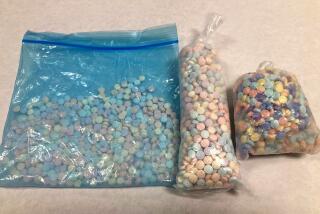Cocaine Users Often Children of Alcoholics, Study Finds
- Share via
America is in the grip of its second cocaine epidemic of the 20th Century, and victims are most likely to be the children of alcoholics, researchers said.
“What we’re finding in cocaine addiction is that there is a very high rate of alcoholism in the family of these people,” said Dr. Amer Rayyes, medical director of the Advanced Recovery Institute in Torrance.
“Children of alcoholics are supplying the numbers of people who are addicted to cocaine,” he said. “If you have an alcoholic parent, your chances of becoming chemically dependent are 400 times greater than a person who does not have a family history of alcoholism.”
He said doctors are particularly concerned about the high incidence of cocaine addiction sweeping the country because the drug easily precipitates serious medical problems in many users.
Variety of Ailments
Heart attacks, strokes, intestinal disorders and depression are common in people who abuse cocaine, he said.
Speaking at the annual scientific assembly of the California Medical Assn. in Anaheim, Rayyes said that a family history of chemical dependency is the only method of determining who will becoming addicted to cocaine and other drugs.
He said emerging evidence suggests that people who become cocaine addicts may carry a gene that predisposes them to chemical dependency, a factor that overwhelms all other predisposing possibilities, he said.
“Some people experiment with drugs and don’t like them at all; others try them and say, ‘Where you have been all my life?’ ” he said.
Good Evidence
“Genetic nature is very real. Studies in Sweden show that babies of alcoholics who were adopted into non-alcoholic families eventually became alcoholics. Alcoholism for these children was directly related to the biological family having a chemical dependency.”
Rayyes said the drug an addict chooses to abuse “is often determined by the culture of that particular decade.”
“Cocaine is not a new drug. At the turn of the century, we had a cocaine epidemic. But the difference was that addicts then did not use the highly potent form of cocaine that we have today,” he said.
He suggests identifying children from families where drug addiction and alcoholism are common and putting them in special programs that warn against the dangers of chemical dependency as a way to possibly save them from addiction in the future.






